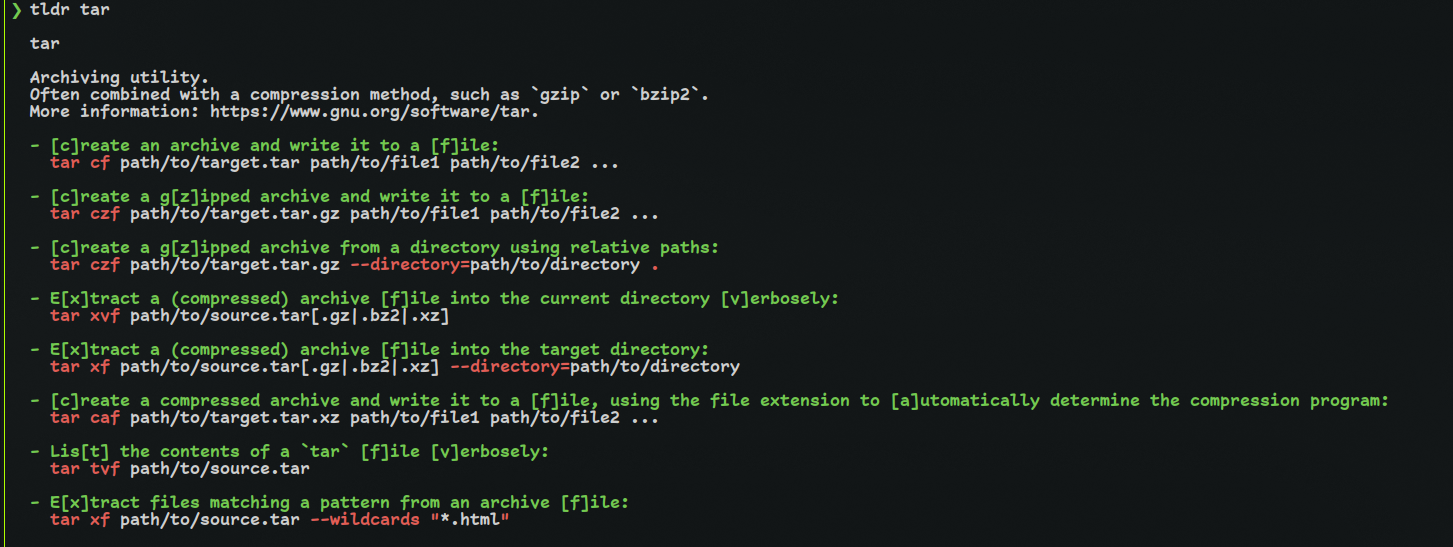img title=“I don’t know what’s worse–the fact that after 15 years of using tar I still can’t keep the flags straight, or that after 15 years of technological advancement I’m still mucking with tar flags that were 15 years old when I started.”
A little trick I learned on here was to imagine yourself as a little evil man saying “Extract ze files!” in a German accent. Extract ze files >>> xzf.
Only works for tar.gz. Remember there’s also tar.xz, tar.bz, tar.bz2 and half have their own extractor flag. FUN. It’s usually J.
Wouldn’t tar --help suffice? Afaik, it returns exit code 0.
tar xzvf file.tar.gzI got it memorized after installing gentoo over and over again from stage 3 back in 2005If you can’t tar to a pipe into ssh to a remote host and untar into an arbitrary location there, are you really using Unix?
I had to pipe dd through gzip over SSH recently to locally image a disk on a cloud server. That was fun.
Surely
tar --helpis a valid tar command, right?Normally I would say view the man page (as a command). Though for some reason when making the thinnest distro possible, the OS team at my job got rid of man.
Wtf man.
man wtf
xtract ze vucking file
Then comes a .tar.bz2 file along and you’re screwed. xtract je vucking file?
Pro tip: -z, -j are not needed by tar anymore since many years, tar will autodetect what compression was used if your distro is anything remotely modern.
You still might want to do something like alias pbtar='tar --use-compress-prog=pbzip2 to easily use pbzip2 - unless you have an ancient system that’ll speed things up significantly. And even if you don’t it’d be nice to use it for creation - to utilize more than one core the archive needs to be created for parallel extraction.
Pro tip: -z, -j are not needed by tar anymore since many years, tar will autodetect what compression was used if your distro is anything remotely modern.
😵
tar -xzvf archive.tar.gzeXtract Zhe Vucking File
Sorry, it was Solaris - you just blew it up (the minus is invalid on many Unix versions of tar)
tar --helpis a valid commandMore of a request than a command, I’d have argued
I command you to show me the manual
tar
Done. That’s a valid command, no error code, nothing. KISS!
tar xvf somearchive.tar
Is that right? )= I’m scared I lost.
user@server:~> tar xvf somearchive.tartar: somearchive.tar: Cannot open: No such file or directorytar: Error is not recoverable: exiting nowScheiße…
I know this is a meme, but I actually find
tarfairly easy to remember.tar -xf $archiveis extract filetar -czf $archive dir/is create zipped (compressed) file and the positional arguments are the files to add to the archive.And this is 99% of my usage. You can skip
-f $archiveto use stdin/stdout or use-Cto change directory (weird name but logically tar always extracts to the current directory). There is also a flag to list which I always forget and lookup each time, but I list much less often.-vis useful for verbose.Overall there are much harder commands to remember.
findalways gets me if I go beyond-name.ps,treeandls(beyond-Al) always get me to open the man page.There is also a flag to list which I always forget and lookup each time
That would be
-t, which I tend to remember as “test”, as in testing to see what is inside the archive!tealdeer is a great program to have installed for easily getting a breakdown of the flags of pretty much any CLI app that at least I can ever think of!














